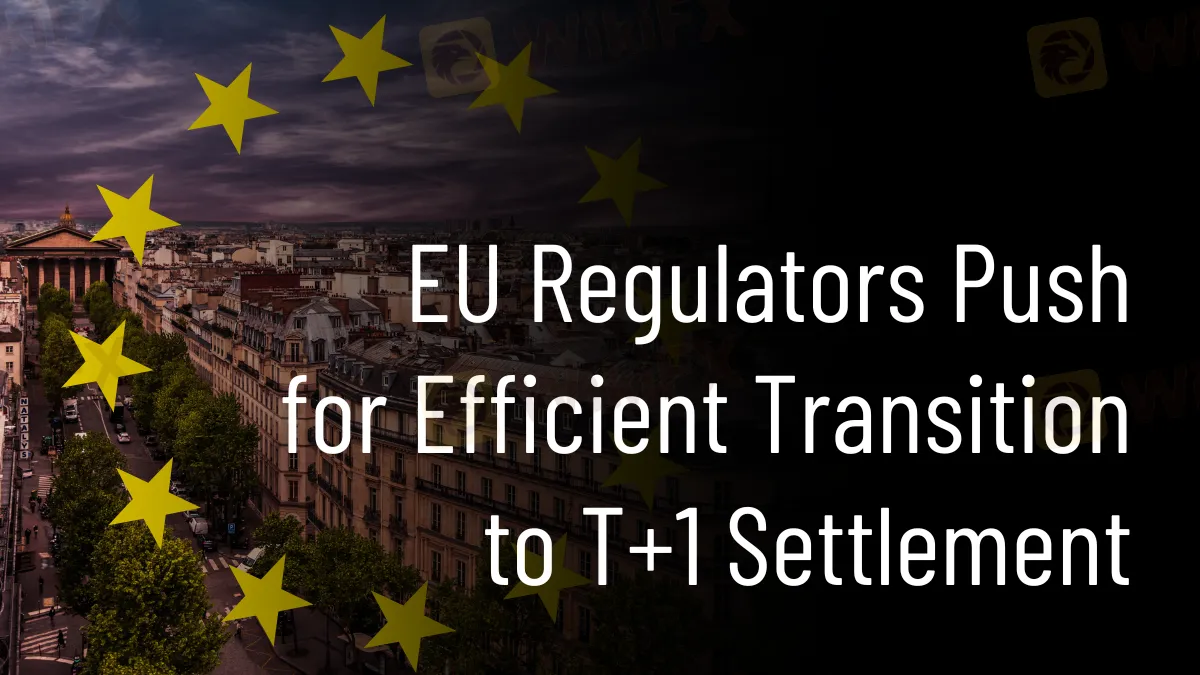简体中文
繁體中文
English
Pусский
日本語
ภาษาไทย
Tiếng Việt
Bahasa Indonesia
Español
हिन्दी
Filippiiniläinen
Français
Deutsch
Português
Türkçe
한국어
العربية
EU Regulators Push for Efficient Transition to T+1 Settlement
Abstract:The AMF and Banque de France call for a coordinated EU transition to a T+1 settlement cycle for securities, emphasizing cooperation and a phased approach.

French financial authorities, the Autorité des Marchés Financiers (AMF) and the Banque de France support a well-coordinated and efficient transition to a T+1 settlement cycle for securities transactions within the European Union. This proposal follows the European Commission's approval of the T+1 concept, representing a significant step toward quicker resolution. However, owing to the specific characteristics of EU markets, this transformation poses significant problems that need a properly calibrated timescale.
The AMF and the Banque de France underline the significance of tight collaboration, notably with the United Kingdom and Switzerland, due to the EU's considerable interdependence with these economies. The appeal for cooperation emphasizes the need for a coordinated strategy to achieve a smooth transition, as the US and Canada successfully implemented the T+1 settlement earlier this year.

To address these problems, the AMF and the Banque de France suggest a sensible two-phased strategy. In the first phase, under the current T+2 settlement cycle, all securities transactions should be verified and allocated before the end of the trading day. This first phase demands critical industry operational and technological advancements, such as data interchange standards and manual process automation. By completing these modifications, the industry will be better prepared for the upcoming move to T+1.
The second step entails shortening the settlement period to T+1, subject to receiving sufficient deal confirmations on the trade date. This stepwise strategy guarantees that the changeover is manageable and that the essential infrastructure is in place before adopting the T+1 settlement cycle completely.
Furthermore, the proposed T+1 framework should contain regulatory components backed by regulatory and economic incentives to help with the transition. These approaches address roadblocks and encourage stakeholders to implement the new system seamlessly.
This comprehensive AMF and Banque de France policy seeks to guarantee a seamless and efficient transition to the T+1 settlement cycle. This program aims to improve market infrastructure and increase investor confidence by ensuring European financial markets' stability, efficiency, and competitiveness.
About the AMF
The Autorité des Marchés Financiers (AMF) is an independent governmental institution safeguarding financial assets. It guarantees that investors obtain enough information and monitors the orderly operation of markets.
About Banque de France
The Banque de France, a Eurosystem member, is an autonomous agency tasked with monetary policy, financial stability, and economic services. It contributes to eurozone monetary policy, regulates banks and insurance firms, and provides various economic services to businesses and consumers.

Disclaimer:
The views in this article only represent the author's personal views, and do not constitute investment advice on this platform. This platform does not guarantee the accuracy, completeness and timeliness of the information in the article, and will not be liable for any loss caused by the use of or reliance on the information in the article.
Read more

Why Hope is Your Worst Enemy in the Stock Market
In the world of equity investing, few forces are as quietly destructive as the investor’s own sense of hope. This psychological trap often known as the "illusion of luck" convinces retail investors that they are among the fortunate few who can defy market logic. More often than not, it ends in losses, disillusionment, and a harsh lesson from the market.

Why Studying A Lot Doesn’t Work | When Technical Analysis Fails
Technical analysis is the go-to toolkit for countless investors. Candlestick patterns, moving averages, MACD signals, Elliott Waves—you name it, there’s a chart or model for it. Many spend years perfecting their craft, poring over price patterns and back testing strategies. Yet, despite all this effort, a large number still lose money. The reason? It’s not the tools as they’re merely instruments. It’s the human behind them that falters. In particular, wishful thinking and emotional bias often sabotage disciplined execution.

Block Fined $40 Million for AML Failures in New York
Block, Inc. has been fined $40 million by New York regulators for serious AML compliance failures, particularly related to its handling of Bitcoin transactions on Cash App.

European Authorities Warn of Irish Scammers’ Fraudulent Schemes Spread Across Region
Police across Europe warn about "Irish scammers" using driveway, home repair, and cash withdrawal scams to target unsuspecting residents in multiple countries.
WikiFX Broker
Latest News
Farewell to the Dollar? Forex Market Speeds Toward De-Dollarization
Innovate Finance Extends Congratulations on WikiEXPO’s Success
Institutional Trading Accelerates Amid Market Volatility in Q1 2025
Tariff Headlines Move Markets: What Every Forex Trader Should Know
Why Joining an Online Trading Community is Essential for Success
Southeast Asia Cracks Down on Scam Centers: Human Trafficking and Fraud Exposed
No Recession in Forex? Is Forex Better Than the Stock Market?
Why Hope is Your Worst Enemy in the Stock Market
What Type of Forex Trader Are You?
Lithuania Fines Revolut €3.5M for Money Laundering Failures
Currency Calculator


